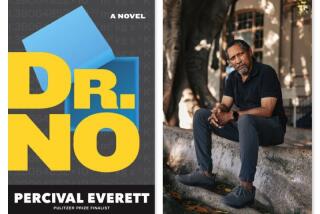Homero Aridjis
When Homero Aridjis, renowned Mexican poet and novelist, was elected president of PEN International last August, the question for many remained: Why is Aridjis only the second Latin American writer to head the organization in its 76-year history?
Clearly, the quantity and quality of writers from Latin America could not be an excuse. Ever since the region’s “boom” generation was introduced to the literary establishment during the 1966 PEN-sponsored reunion in New York, both the talent and number of Latin writers following in the footsteps of Colombia’s Gabriel Garcia Marquez, Mexico’s Carlos Fuentes, Peru’s Mario Vargas Llosa and Argentina’s Julio Cortazar continue to grow.
The snub didn’t mean, either, that writers from that corner of Earth didn’t need the protection of the venerable writer’s association founded in London in 1921 by such influential European men of letters as John Galsworthy, Joseph Conrad and Anatole France. In fact, the opposite is true: Life has often been dangerous and difficult for writers in Latin America.
Some believe prejudice has kept all non-American or non-European writers out of leadership positions within PEN. But a simple reason may be that few writers of any emerging literatures hang out in the elite international writing circles.
That was not the case with Aridjis. Known worldwide, he has published 26 books: fiction, poetry, drama and essays. His work has been translated into 12 languages. Aridjis has also served as Mexico’s ambassador to the Netherlands and Switzerland and twice received a Guggenheim fellowship. This year, in addition to winning the PEN job, he has been awarded the Prix Roger Caillois in France and, in years past, several literary prizes in Mexico and Italy.
He is also the founder and president of the Group of 100, a respected environmentalist association of writers, artists and scientists from several countries. His battles to protect the marine turtle, the gray whale and the Monarch butterfly have won him international recognition as a dedicated environmentalist.
Aridjis is so well-known that once he was elected president, questions arose about how he will affect the activities of PEN. Will it become aligned with its new president’s environmental activism? Will it be more proactive in demanding protection for journalists and novelists threatened with violence because of what they write. Aridjis himself recently received death threats.
A short time ago, Aridjis sat down for a conversation in his book- and art-filled Mexico City home. He lives there with his wife of 32 years, Betty Ferber, who does the English-language translations of his work, while their two grown daughters, Cloe and Eva Sofia, live in the United States.
Question: What can a Latin American writer like you offer an organization like PEN International?
Answer: Traditionally, PEN’s vision has been too Eurocentrist. That, however, is changing, and my election shows that. At the same time, my election proves that there is a recognition of the quality of the emerging literatures that are modifying the world’s literary map.
Latin American writers bring to literature a new vitality. We understand the European tradition, but we are also engaged in the conservancy of the environment in its purest forms. We come from a region where ancient ecosystems are being destroyed and ought to be protected.
Q: What does it mean to be a Mexican and the president of PEN International?
A: In the first place, it means the presidency of PEN International is out of Europe. In 1976, when Mario Vargas Llosa was the president of the organization, he lived in London. I live in Mexico and that makes a difference.
On the other hand, apart from us two, no Latin American, Asian or African writer has ever been in that position. It has always been an American or a European. I should also point out that I can serve from Mexico because we live now in a world of global communications that makes it possible to connect with headquarters in London.
Q: Are you implying that the Latin American, Asian and African literary talent has not been properly recognized?
A: In 1989, a Nigerian writer, Chinua Achebe, presented his candidacy to head PEN and the Francophone countries opposed him and asked if there wasn’t a more “presentable” writer to preside over PEN. They did not want a black person representing PEN.
Q: You are an environmentalist and a human rights activist. You are also a poet and a novelist. You’ve been a diplomat. What are you bringing to PEN?
A: I have an updated vision of the world, and I will work very hard to establish a new PEN committee, the Culture and Environment Committee. Now, PEN has only four: the Writer’s in Prison Committee, Freedom of Expression, Women Writers and Translation and Linguistics.
Q: How do you bring the environment into literature?
A: One of the biggest problems of our time is the environment. The agony of Earth; the depletion of the ozone layer; the pollution of oceans, lakes and rivers; the destruction of the forest; the disappearance of animal species; the contamination in cities. Nowadays, no writer can ignore these problems. There are many writers who have integrated these problems into their work, we now see the trees and the sky in a different way.
Q: But isn’t this kind of activism among literati what worries many Francophone countries?
A: Yes. When my candidacy was launched in Edinburgh last August, the Francophone countries argued that the defense of human rights ought not to be one of PEN’s concerns and proposed to end all kinds of activism within PEN. Then, an African poet who is exiled in London questioned them. He said: “If that is the case, what am I doing in PEN? PEN saved my life and flew me out the country where I was going to be killed.” The Chinese, the Iraqis, the Kurdish writers seconded him. There are so many writers who are in danger because of their writing. Not all of us write in a safe environment.
Q: How did you shift from being a contemplative poet into an activist?
A: Precisely by becoming involved in the defense of the environment. When I was a child, I thought of trees as something permanent and stable. It was also a representation of serenity. Something different from the violent world of men. Then as I grew up, I saw man’s aggression against nature. That is how I decided to defend what I love; otherwise, all my poetry would be nothing but rhetoric. I would be talking about trees and rivers without becoming involved with them.
Q: How did you first get involved with PEN?
A: It began in 1966, in February. Betty, my wife, and I went to a reading by Norman Mailer, and after the reading, there was a party and we chatted with Mailer and Lewis Galantiere, who was vice president of PEN’s American Center. Arthur Miller, who was PEN’s president, asked us about other Latin American writers, and we provided him with a long list of writers that included Pablo Neruda, Jorge Luis Borges, Octavio Paz, Ernesto Sabato, Mario Vargas Llosa, Juan Carlos Onetti. It was like an ideal list of Latin American voices.
Later on, most of those included on the list were invited to the World Congress of Writers in New York that introduced the “Boom” in the United States. It also marked the return of Neruda to America; New York received him enthusiastically.
Q: Did you get involved then?
A: Not really. I became a member of PEN but by that time, I applied for a Guggenheim fellowship and went to live in Europe. The trip lasted 14 years--living in different countries--and the world of my poetry changed. I wrote a book that synthesizes this stage of my life called “Blue Spaces.” This was a time full of hopes. Betty and I were discovering freedom, life. Then we moved to New York, where I taught; and later I joined the Mexican Foreign Service as ambassador to Holland and to Switzerland.
Q: Who appointed you ambassador?
A: Luis Echeverria. He was the president who tried to bridge the gap created in Mexico in 1968. He tried to establish links between the Mexican cultural world and the government.
Q: Do you feel any remorse for serving under Echeverria’s authoritarian regime?
A: No, because I always thought I was serving the country, not the government. As a poet, I was helping Mexican culture. I was not a political appointee but a representative of Mexican culture.
Q: But how does it feel to go from collaboration to confrontation with the Mexican government?
A: You go through many changes in life and you have to live every moment the way it comes. Your relationship with power changes with time.
We live in a country where there is no infrastructure of support for intellectual activities. Mexico is not like the United States. Furthermore, in that time there were no foundations funding projects and no grants. The government was the only benefactor. . . .
Q: Going back to a point raised before, how do you explain the success of the Latin American “boom” and why hasn’t there been another “boom?”
A: I believe the story of the “boom” has yet to be written. But we need to do an in-depth investigation. While I was in New York, from 1969 to 1972, right at the height of the Cold War, there was a tug of war between Cuba and the United States to attract Latin American writers to their side. The Cubans were flirting with the writers and the U.S. was doing its best to attract them, too.
In the U.S. the Rockefeller Foundation sponsored a Center for Inter-American Relations devoted to translate and promote these writers. We have yet to find out to what extent the Central Intelligence Agency was involved in the promotion of books written by leftist Latin American authors . . . .
But with the end of the Cold War, the United States lost its politically driven interest in Latin American writers. Now, the interest in Latin American writers is market-driven.
Q: But wouldn’t your election to PEN International generate a new interest in Latin American literature? When you talk about shifting the Eurocentrist focus of PEN, aren’t you saying there is a literature in Latin America that has been unfairly ignored?
A: As PEN president, I am very much interested in opening and reactivating PEN centers in Africa, Asia and Latin America. In places where the human rights of writers and journalists are abused.
Q: What do you want to accomplish with a reinvented PEN?
A: I want to have a PEN that is alive and reunites large numbers of writers from across the world. Writers face new challenges, new types of fundamentalism. In the ‘20s there were ideological and political fundamentalism, like Stalinism or Nazism. Now we face political and religious fundamentalism.
Then, there are countries that fall back into dictatorships after being democratic for a little while. Then we have the countries where human rights abuses are the norm, like China, Turkey, Iran, Iraq, Nigeria, Peru, Cuba.
Q: By the time you end your term, what do you hope to have accomplished?
A: . . . I hope the Culture and Environment Committee is adopted by specific PEN centers throughout the world and it plays an important role in the activities of PEN worldwide. I hope to increase membership substantially and to organize conferences in which the real modern topics that affect the world now are analyzed. I wish we get to understand how human kind has lived and will live in between the two millennium.
More to Read
Sign up for our Book Club newsletter
Get the latest news, events and more from the Los Angeles Times Book Club, and help us get L.A. reading and talking.
You may occasionally receive promotional content from the Los Angeles Times.







